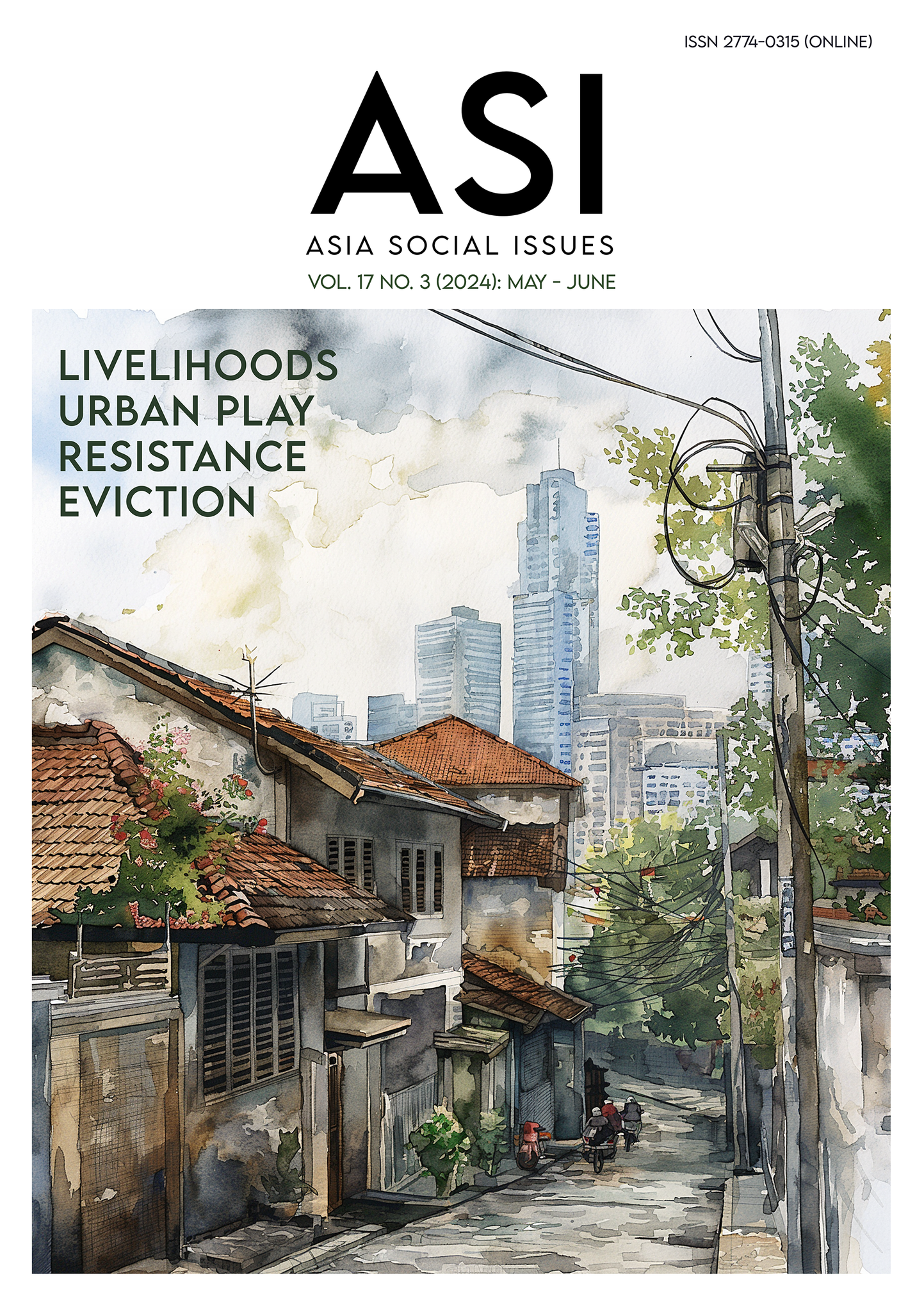The Co-Production and Sustainability Policies: Multi- Case Study in Water Management Policies in Thailand
Main Article Content
Abstract
Co-production and sustainability are intertwined concepts, especially in water management. Co-production is a powerful tool for promoting sustainability by fostering collaboration between government representatives and community members to organize public services professionally. This study aimed to 1) comprehensively examine co-production in water management in Nan and Phayao Provinces and 2) investigate co-production models in policy formulation and implementation. It focuses on two case studies: Ban Tun Sub-district in Phayao Province and Rong Ngae Village in Nan Province, Thailand. This study adopted a qualitative research design, utilizing the methods of document analysis, in-depth interviews, and non-participatory observation. Data triangulation was employed to ensure data validity, and a semi-structured interview was utilized as the data collection tool. Content analysis and qualitative data analysis software were used to analyze the data. The findings revealed full co-production, influenced by norms and cultures, existing policies, and knowledge that collectively informed the relationships among the communities, stakeholders, and agencies working in the water management sector. The co-production model combined top-down and bottom-up policymaking, guided by Van Meter & Van Horn’s implementation model, promoting stakeholder collaboration for sustainable water management. Recommendations included 1) expanding knowledge and capacity-building for stakeholders in water management, encompassing existing knowledge bases and new technologies, and 2) developing explicit guidelines and improving communication channels to promote co-production.
Article Details

This work is licensed under a Creative Commons Attribution-NonCommercial-NoDerivatives 4.0 International License.
Copyright: CC BY-NC-ND 4.0
References
Adams, W. M. (2006). The future of sustainability: Re-thinking environment and development in the twenty-first century. Retrieved from https://portals.iucn.org/library/node/12635
Armitage, D., Berkes, F., Dale, A., Kocho-Schellenberg, E., & Patton, E. (2011). Co-management and the co-production of knowledge: Learning to adapt in Canada’s Arctic. Global Environmental Change, 22(1), 995-1004.
Boonrattanamaitri, A. (2015). The concept of public service provision of the state and local government organizations. Journal of Politics and Governance, 6(1), 25-37.
Bovaird, T. (2007). Beyond engagement and participation: User and community coproduction of public services. Public Administration Review, 67(5), 846-860.
Boyle, D., & Harris, M. (2009). Challenge of co-production, Nesta. Retrieved from www.nesta.org.uk/publications/challenge-co-production
Brudney, J. L., & England, R. E. (1983). Toward a definition of the coproduction concept. Public Administration Review, 43, 59-65.
Chuenchum, P., Suttinon, P., & Ruangrassamee, P. (2016). Cross-sectoral impact of water deficits in Nan River Basin (pp.1-10). In Proceedings of the 2nd World Irrigation Forum (WIF2), Chiang Mai, Thailand: The International Commission on Irrigation and Drainage.
Distanont, A., Khongmalai, O., Rassameethes, R., & Distanont, S. (2018). Collaborative triangle for effective community water resource management in Thailand. The Kasetsart Journal of Social Sciences, 39(3), 374-380.
Hill, M., & Hupe, P. (2009). Implementing public policy: an introduction to the study of operational governance (2nd eds.). London, England: Sage Publications.
Jensantikul, N. (2023). Social welfare for Thailand’s elderly: Policy perspectives and proposals for co-production. Asia Social Issues, 16(3), e253814.
Khamsorn, P., Phenruedee, P., & Sanwangsri, M. (2019). Assessing of water balance components in dry dipterocarp-forested watershed in Phayao, Thailand (pp. 86-103). In Proceedings of the 5th Environment Asia International Conference. Chiang Mai, Thailand: Thai Society of Higher Education Institute on Environment.
Kijne, J., Barker, R., & Molden, D. (2003). Improving water productivity in agriculture: Editors’ overview. Agricultural Water Management, 59(1), 1-3.
Luyet, V., Schlaepfer, R., Parlange, M. B., & Buttler, A. (2012). A framework to implement Stakeholder participation in environmental projects. Journal of Environmental Management, 111, 213-219.
Maiklad, P. (2014). Solutions for water management in Thailand. Thailand Development Research Institute (TDRI). Retrieved from https://tdri.or.th/water/thaipublica20140309.
Nuamcharoen, S., & Sattakorn, W. (2020). Key success factors in water management for sustainability in Phrae province, Thailand (pp. 92-102). In Samat, N., Sulong, J., Pourya Asl, M., Keikhosrokiani, P., Azam, Y., & Leng, S. T. K. (Eds.). Innovation and Transformation in Humanities for a Sustainable Tomorrow, vol 89. European Proceedings of Social and Behavioural Sciences. European Publisher.
Radnor, Z., Osborne, S.P., Kinder, T. & Mutton, J. (2014). Operationalizing co-production in public services delivery: The contribution of service blueprinting, Public Management Review, 16(3), 402-423.
Santhitiwanich, A. (2015). Co-creation of rural production: a case study of waste management of Nam Yuen Subdistrict Municipality. Veridian E-Journal, Silpakorn University, 8(1), 690-699.
The Office of National Resources. (n.d.). Thai water resources master plan (2018-2037). Retrieved from http://www.onwr.go.th/en/?page_id=3824
Tissamana, A., & Amornsiripong, S. (2019). Deliberative democracy in water management: Case studies, Kraseaw irrigation and maintenance project in Dan Chang district, Suphanburi province, and Chonlahan Pichitra irrigation and maintenance project in Klong Dan district, Samut Prakarn province, Thailand. Thammasat Review, 22(2), 19-35.
United Nations. (n.d.). Transforming our world: The 2030 agenda for sustainable development. Retrieved from https://sdgs.un.org/2030agenda.
Van Meter, D. S., & Van Horn, C. E. (1975). The policy implementation process: A conceptual framework. Administration & Society, 6(4), 445-488.
Wyborn, C., Datta, A., Montana, J., Ryan, M., Leith, P., Chaffin, B., Kerkhoff, L. V. (2019). Co-producing sustainability: Reordering the governance of science, policy, and practice. Annual Review of Environment and Resources, 44(1). 3-12.


